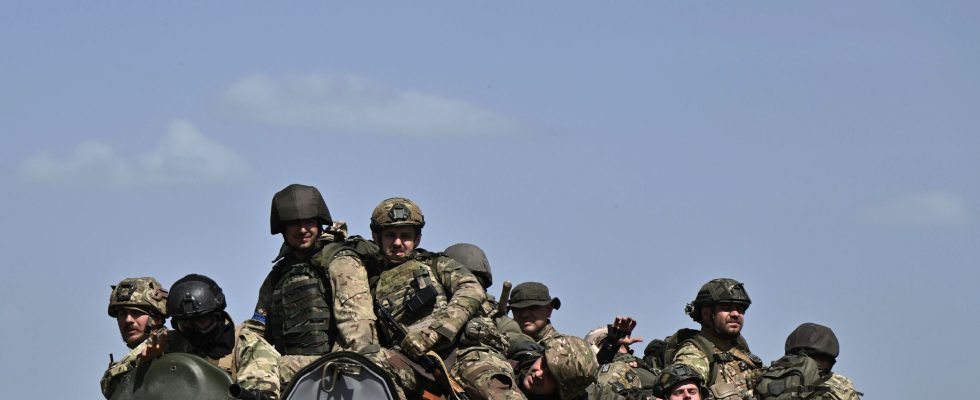How can we estimate the duration of the war and the possible moment to negotiate its end? In Ukraine, the issue is taboo. From the director of the Chernihiv maternity hospital, hit by the blast of three Iskander ballistic missiles that fell on the neighboring hotel on April 17, to state officials at the highest level of the presidential office in Kiev like Ihor Zhovkva, including soldiers returning from the front or a rescuer exhausted by the sight of corpses, no one makes the slightest concession on the declared objective of continuing the fighting “until the last Russian soldier is gone or dead” and of recovering the integrity of the national territory. A deputy from the ruling party, Oleksandr Merezhko, defines their morale with this phrase from the boxer Mike Tyson: “Yes, I am tired. But if I stop fighting, I will not improve my situation. So I continue to fight. beat.”
In the largest hospital in Lviv, near the Polish border, men and women victims of the war meet in the gym. Sasha and Ilya return from the front. They practice walking on a treadmill and balancing on a wobble board with their single leg. The other is an amputee. They get used to their new prosthesis in this hospital unit specializing in psychological rehabilitation and the manufacture of state-of-the-art bionic prostheses. Sasha wants to return to civilian life, Ilya is in a hurry to return to fight. “50% of the soldiers treated here ask to return to the front,” says the director of this 1,200-bed unit called Unbroken (Intact). The name comes from one of the patients who, before also returning to war, had given his caregivers a drawing crossed out with this word: Unbroken.
More discreetly, Ukrainians are torn between resilience and weariness. The mobilized soldiers are living worse and worse than in the west of the front line, and in particular in kyiv, life seems cut off from the reality of war. “For a large part of Ukrainians, the fighting in Donbass is as distant as Somalia,” notes a security and defense official coldly.
Act hard and fast
How to end the war? After the failed Ukrainian counter-offensive in the summer of 2023 and a stunning resumption of the advantage by the Russians, the dynamic is reversing slightly. Against the backdrop of Ukrainian successes in the Black Sea, everything is happening at the same time: the American release of 60.8 billion dollars in aid, the delivery in June of the F-16 combat planes promised for a year, the sending of missiles air defense including two Patriot anti-missile batteries by Germany, a million shells produced in Europe or purchased by Europeans from third countries, new ATACMS missiles delivered by the Pentagon and capable of hitting heavily the rear of the army Russian… The American aid plan also authorizes President Joe Biden to confiscate and sell Russian assets to finance the reconstruction of Ukraine.
The Ukrainians are fighting at least four battles at the same time. Alongside the military war on the ground, the psychological war in the minds, the judicial war consisting of scientifically documenting Russian war crimes, there is the diplomatic war. Neither the Russians nor the Ukrainians are yet able to achieve their objective. kyiv has no plans to negotiate territories, but does not seem to exclude a stage or a pause in a war of attrition for which there is no end.
Two deadlines are forcing American and European allies to act strongly and quickly: the American election in November, where a victory for Donald Trump against Joe Biden would sign the victory of Vladimir Putin in Ukraine, and the peace conference planned for Switzerland in June , following on from the G7 in Italy. The G7 countries, enlarged to include China and the countries of the “Global South” – without Russia, will meet, at the initiative of President Zelensky. Officially, to take stock of the consequences of the war on the world economy. Unofficially, to convince the Chinese and the countries of the South to put pressure on Putin. This timing coincidence cannot be due to chance, at the moment when Ukraine, in June, will be in the strongest position.
.
